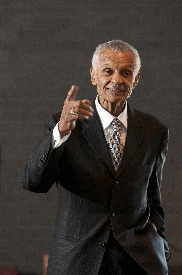University News
86-year-old Civil Rights leader at WIU: Education the Next Frontier for Equal Rights
September 17, 2010
MACOMB, IL - - In his Sept. 17 speech at Western Illinois University, Rev. C.T. Vivian, a Macomb native and WIU alumnus who was a close friend and lieutenant of Dr. Martin Luther King, Jr., said today's minority students are not receiving the level of education, or educational support, they can and should be.
Vivian spoke at WIU, as well as Edison School and Macomb High School, as part of a national initiative sponsored by The HistoryMakers project. Citing low college-placement test scores and high dropout rates for African American high school students, Vivian delivered a passionate speech in front of a crowd in the University Union Sandburg Lounge.
"What we did for civil rights then, we've got to do that in education now," he said. "There's got to be an education movement that's just as important as the Civil Rights Movement was."
Though the era of segregation may long be officially over, there is still much to be done for equality, Vivian argued.
"'Every struggle makes a greater struggle necessary,'" he said, quoting the poet Walt Whitman. "It's not just about passing a [equal rights] bill, but how do we live up to that bill? We've got to civilize everybody in this country. That [African American students being disadvantaged] would not be happening to part of the society if the whole society was civil."
Rev. C.T. Vivian was born Cordy Tindell Vivian in 1924 in Howard County, Missouri. He told the audience that his parents had a dream for him to be able to receive an education, which at the time would have only been expected to last until the eighth grade.
"I never would have been who I was if not for Macomb, Illinois," he said. "We'd lost everything in the Great Depression, and they wanted to protect the one thing they still had [their child]. They wanted to leave Missouri because of segregation, so we came to Macomb because I could start first grade here and go all the way through college."
Vivian graduated from Macomb High School in 1942 and went on to attend Western Illinois University, where he worked as the sports editor for the student newspaper. His career as an activist began in Peoria, (IL), where he participated in his first sit-in demonstrations, which successfully integrated Barton's Cafeteria in 1947.
Well-known for his participation in the movements against discrimination in the South, Vivian founded the Black Action Strategies and Information Center and launched Churches Supporting Churches. He was appointed to the executive staff of the Southern Christian Leadership Conference (SCLC) in 1963, when Dr. Martin Luther King Jr., named him national director of affiliates.
According to his official bio, it was two years later, in an incident that would make national news, Vivian confronted Sheriff Jim Clark on the steps of the Selma (AL) courthouse during a voter registration drive, and, after delivering an impassioned speech, was struck on the mouth by Clark. Vivian had studied for the ministry at American Baptist College in Nashville, (TN) in 1959, where he had met Rev. James Lawson, who teaching Mahatma Ghandhi's nonviolent direct action strategy to the Student Central Committee.
In 1969, Vivian wrote the first book on the modern-day Civil Rights Movement, "Black Power and the American Myth." He also started a program to send Alabama children to college, which would later become the national program Upward Bound. In 2003, Macomb City officials designated a portion of West Murray Street as C.T. Vivian Way. Macomb Mayor Mick Wisslead also proclaimed Sept. 26 as C.T. Vivian Day.
Vivian stressed the value of the opportunity for African American students to serve as leaders after graduating from college and not just focusing on "making a buck," and urged educators of young people to focus on "not just legalisms, but the greater struggle that's necessary" for equality.
"The question is, how do we lift a nation?" he said. "We talk about the power of education, but what are we doing about it? Our students are not educated at the level they need to be. They might graduate from high school, but are they college ready? Or they drop out. Every problem we have in society is based on the lack of knowledge."
He reminded the crowd that "Martin King," as he called him, led "not a political movement, but a moral and spiritual one."
"What he said was 'To redeem the soul of America,'" Vivian said. "That's different from 'Let's get a bill passed.'"
The HistoryMakers is a national non-profit educational institution that works to develop an archival collection of thousands of African American video oral histories, with the goal of completing 5,000 interviews of both well-known and unsung African Americans. The Back-to-School with The HistoryMakers program deploys living African American history makers into schools in more than 30 states to recount their own school experiences and the struggles they encountered. Along with Vivian, other participants in the program include former U.S. Senator and Ambassador Carol Moseley Braun, poet Nikki Giovanni, actress Marla Gibbs, U.S. Secretary of Education Arne Duncan, and CNN's Soledad O'Brien.
For more information, visit thehistorymakers.com.
Posted By: University Communications (U-Communications@wiu.edu)
Office of University Communications & Marketing


Connect with us: